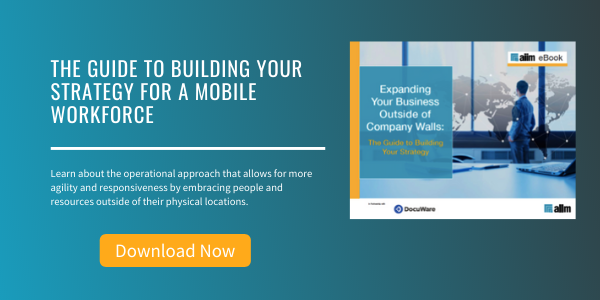
Which Are People More Likely to Own - a Cell Phone or a Toothbrush?
Enterprise Content Management (ECM) | Mobile
It seems like only yesterday that the IPhone first appeared. It's hard to believe how long the iPhone - and all the sons of iPhones for those initially held in Verizon and Sprint purgatory - have been with us. NOT! Believe it or not, it's been less than 5 years. A blink of an eye.
The iPhone was introduced in June 2007, to fairly widespread snickering among "serious" technology types. Per blogger Mark Flosser, "The initial reaction from competitors, or soon-to-be competitors since Apple wasn’t really in the game yet, was either shock or laughter. RIM didn’t think it was possible to have such a device without it being a power hog. Microsoft’s Steve Ballmer laughed at it for not having a physical keyboard."
I will confess to being swept up early in the iPhone frenzy, and ultimately convinced my IT types to chill, that I would handle my own tech support, and that everything would be OK. (And true confessions, for the most part, it was. And yes, I do understand that technology in a small 45-person organization is different than technology in a Fortune 500 company.)
Well, a lot has changed. We now find ourselves in…
- A world in which there are now more tablets and smartphones sold than PCs.
- A world in which more people have cell phones than toothbrushes. Yikes.
- A world in which our customers expect to use a mobile device to: 1) interact with us; interact with the information we provide; and 3) interact with the processes that drive our businesses.
- A world in which our employees are increasingly working outside of traditional, chained to the desk, office environments, and expect to use multiple devices and locations to interact with corporate information and systems that we once thought of as locked down and "company confidential."
Ubiquitous mobile computing is one of the core underlying drivers for Systems of Engagement and continues to shape the future of these systems. In the span of a decade, cell phones have spread to essentially every person and location on the planet. Less than half the devices accessing the Internet run on Windows, and the shipments of smartphones and tablets are now larger than the shipments of laptops and PCs. Mobile technologies have been the "steroid" accelerating the push to social technologies, and this push is now spreading to the business. And all of this is not just in the context of smartphones but in the context of an ever-increasing array of devices beyond smartphones that are truly mobile.
On the opportunity side, we now interact with customers on devices that are aware of their location. If we know exactly where a customer is in real-time, what does this mean in terms of the kinds of new products and services we can deliver? If our customers carry around connected devices with 5-megapixel portable cameras and scanning devices in their pockets, what does this mean in the context of our interactions with them?
The natural reaction of IT in the face of this dramatic change to fall back into the control paradigm. Witness the following…
- 76% of organizations have no mobile processes: 24% haven’t even thought about it, 20% have security reasons or feel it adds no value, 32% have evaluated it but not made a move.
- A third of organizations have not optimized their websites for mobile. Of those that have, only 8% specifically test access to all pages and forms, and only 10% have apps -- and only 5% check for tablet resolution.
- Median % of processes that could be mobile that actually are = 2.5%.
- Only 47% of organizations allow personal devices to access company data, and most do so in a policy void.
- Mobile access to ECM systems is somewhat restricted. 37% of organizations have no mobile access available on their ECM systems, and a further 30% would need to rely on a conventional web interface. 15% have a dedicated app, at least for iPhone.
- 42% expect staff to carry two phones, a company one and a personal one. 47% allow personal devices to access company data, but only a third of those who enforce data-wipe policies. The rest rely on employee trust. 20% have no usage policy on mobile, and 9% allow staff to hook up in an ad hoc way.
The potential benefits of embracing mobile are significant:
- Median expected productivity improvement among administrative staff for automated processes = 29%.
- 67% of organizations believe that mobile technologies are "important or extremely important to improving their business processes.
- Median expected productivity improvement for field-based or traveling staff if they could input directly to, and/or interact with back-office processes using mobile (hand-held) devices = 25%.
- The median organization that has deployed mobile solutions is 2.7X faster in responding to customers and staff than those that have not.
While we can't ignore the control factor, we need to respond aggressively to the opportunities afforded by mobile. Mobile needs to be a part of every IT decision, not an afterthought. We must invest in the required technical skills, which are different from traditional IT skills, which we need to take advantage of mobile. We need to set our focus on where our customers will be three years from now in terms of mobile, and figure out how our IT strategies and systems will meet them when they get there.
About John Mancini
John Mancini is the President of Content Results, LLC and the Past President of AIIM. He is a well-known author, speaker, and advisor on information management, digital transformation and intelligent automation. John is a frequent keynote speaker and author of more than 30 eBooks on a variety of topics. He can be found on Twitter, LinkedIn and Facebook as jmancini77. Recent keynote topics include: The Stairway to Digital Transformation Navigating Disruptive Waters — 4 Things You Need to Know to Build Your Digital Transformation Strategy Getting Ahead of the Digital Transformation Curve Viewing Information Management Through a New Lens Digital Disruption: 6 Strategies to Avoid Being “Blockbustered” Specialties: Keynote speaker and writer on AI, RPA, intelligent Information Management, Intelligent Automation and Digital Transformation. Consensus-building with Boards to create strategic focus, action, and accountability. Extensive public speaking and public relations work Conversant and experienced in major technology issues and trends. Expert on inbound and content marketing, particularly in an association environment and on the Hubspot platform. John is a Phi Beta Kappa graduate of the College of William and Mary, and holds an M.A. in Public Policy from the Woodrow Wilson School at Princeton University.



